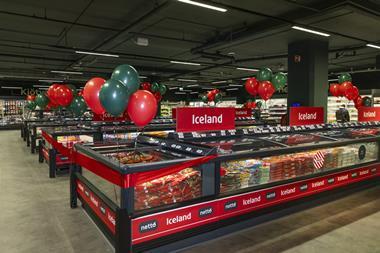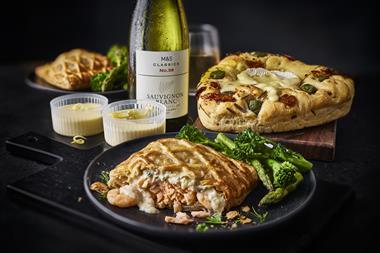It’s been a tough year for frozen food and that’s not been good news for our top retailer, says Gaelle Walker
Iceland’s new-found confidence (see page 36) must have impacted smaller rivals such as Farmfoods. However, Herd says that this year’s blip reflects the general decline in the frozen food category. He says Farmfoods has managed to buck that trend in recent years, but was unable to do so this year.
Alf Carr, director general of the British Frozen Food Federation, agrees: “Frozen food sales were deeply disappointing last year, with ready prepared meals the worst hit.”
Looking ahead, Carr insists it’s not all doom and gloom for frozen food - nor for retailers such as Farmfoods, of which he is clearly a big fan.
He takes heart from the fact that Morrisons and Iceland both enjoyed strong food sales over Christmas and says: “These results are very promising, and I expect to see a strong revival in frozen foods this year.”
While Farmfoods is clearly proud of its heritage as a frozen food retailer - and boasts of that on its website where it talks about ‘taking frozen food very seriously’ - it is clear from taking a trip around any Farmfoods store that much more emphasis is being placed on ambient grocery lines within the business.
Take the Sunbury store in Middlesex. Since we visited for our Top 50 report last year, the glass window at the front of the store has been blacked and the interior has been
modified to include shelving for cakes, biscuits, crisps and other confectionery and snack goods
However, the core of the business remains frozen foods, with a good balance between brands and own label. There’s a simple pricing structure, with all products labelled as £1, £2, or £3, as well as some tempting deals such as ‘Any 3 items for £1’.
With more than 50 years of retailing history and an annual turnover of more than double that of the retailer in our number two spot, Farmfoods is one of the UK’s most successful private retailers and has maintained its position at the top of The Grocer’s Top 50 list.
However, latest figures from the frozen food specialist show that life on the farm is less bountiful than in previous years.
According to figures supplied by the company’s managing director Eric Herd, its annual turnover fell 1.2%, from £420m in 2004 to £415m in 2005. In last year’s table, by way of contrast, it had enjoyed an impressive 20% growth in turnover.
The latest figure is all the more surprising, given that Farmfoods’ store estate, which now stretches from the north of Scotland to the south coast of England and the west of Wales, has increased from 295 in last year’s ranking to 302 this year.
The store is festooned with an array of promotional signs and offer posters - and it’s this promise of value for money that draws customers through the door. As mother of three, Linda Gibbs says: “Why would I want to go anywhere else when I can get everything I need from here at a fraction of the cost?”
Brandishing her receipt, she adds: “I’ve just bought the bulk of my weekly shopping for under £10. Tell me how you can fault that?”
Michelle Bradley from Lower Sunbury is quick to agree: “It’s my daughter’s fifth birthday at the weekend and I’ve just bought a whole bag of party food for half the price that I would pay at even Tesco or Asda.”
Such glowing endorsements will, no doubt, be music to the ears of Herd back at Farmfoods’ HQ in Cumbernauld.
Last January, Herd tightened his control of the company with the acquisition of his brother Gordon’s 21.2% stake for £10.2m. Herd now has a 98.6% share in Farmfoods, with the rest owned by William McCreadie, another director.
Herd is notoriously shy of publicity, and avoids all interviews. But there’s no doubting the fact that he is keen to keep expanding the company. Its website identifies a plethora of towns where it is keen to establish a presence - particularly within the M25 where it has limited representation.
And with a fiercely loyal customer base, and strong business strategy, the future looks bright for this coolest of operators.
Iceland’s new-found confidence (see page 36) must have impacted smaller rivals such as Farmfoods. However, Herd says that this year’s blip reflects the general decline in the frozen food category. He says Farmfoods has managed to buck that trend in recent years, but was unable to do so this year.
Alf Carr, director general of the British Frozen Food Federation, agrees: “Frozen food sales were deeply disappointing last year, with ready prepared meals the worst hit.”
Looking ahead, Carr insists it’s not all doom and gloom for frozen food - nor for retailers such as Farmfoods, of which he is clearly a big fan.
He takes heart from the fact that Morrisons and Iceland both enjoyed strong food sales over Christmas and says: “These results are very promising, and I expect to see a strong revival in frozen foods this year.”
While Farmfoods is clearly proud of its heritage as a frozen food retailer - and boasts of that on its website where it talks about ‘taking frozen food very seriously’ - it is clear from taking a trip around any Farmfoods store that much more emphasis is being placed on ambient grocery lines within the business.
Take the Sunbury store in Middlesex. Since we visited for our Top 50 report last year, the glass window at the front of the store has been blacked and the interior has been
modified to include shelving for cakes, biscuits, crisps and other confectionery and snack goods
However, the core of the business remains frozen foods, with a good balance between brands and own label. There’s a simple pricing structure, with all products labelled as £1, £2, or £3, as well as some tempting deals such as ‘Any 3 items for £1’.
With more than 50 years of retailing history and an annual turnover of more than double that of the retailer in our number two spot, Farmfoods is one of the UK’s most successful private retailers and has maintained its position at the top of The Grocer’s Top 50 list.
However, latest figures from the frozen food specialist show that life on the farm is less bountiful than in previous years.
According to figures supplied by the company’s managing director Eric Herd, its annual turnover fell 1.2%, from £420m in 2004 to £415m in 2005. In last year’s table, by way of contrast, it had enjoyed an impressive 20% growth in turnover.
The latest figure is all the more surprising, given that Farmfoods’ store estate, which now stretches from the north of Scotland to the south coast of England and the west of Wales, has increased from 295 in last year’s ranking to 302 this year.
The store is festooned with an array of promotional signs and offer posters - and it’s this promise of value for money that draws customers through the door. As mother of three, Linda Gibbs says: “Why would I want to go anywhere else when I can get everything I need from here at a fraction of the cost?”
Brandishing her receipt, she adds: “I’ve just bought the bulk of my weekly shopping for under £10. Tell me how you can fault that?”
Michelle Bradley from Lower Sunbury is quick to agree: “It’s my daughter’s fifth birthday at the weekend and I’ve just bought a whole bag of party food for half the price that I would pay at even Tesco or Asda.”
Such glowing endorsements will, no doubt, be music to the ears of Herd back at Farmfoods’ HQ in Cumbernauld.
Last January, Herd tightened his control of the company with the acquisition of his brother Gordon’s 21.2% stake for £10.2m. Herd now has a 98.6% share in Farmfoods, with the rest owned by William McCreadie, another director.
Herd is notoriously shy of publicity, and avoids all interviews. But there’s no doubting the fact that he is keen to keep expanding the company. Its website identifies a plethora of towns where it is keen to establish a presence - particularly within the M25 where it has limited representation.
And with a fiercely loyal customer base, and strong business strategy, the future looks bright for this coolest of operators.

















No comments yet